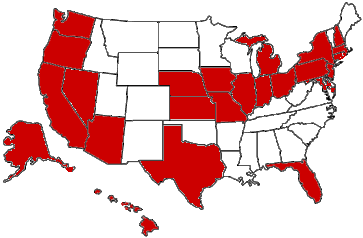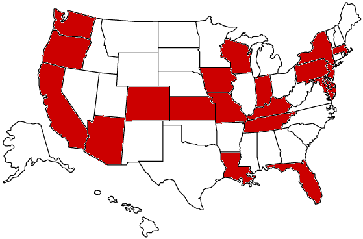Today I sent Routledge the manuscript for Radio’s Digital Dilemma: Broadcasting in the 21st Century. 81,221 words over eight chapters, 285 typescript pages in all. The publisher’s new synopsis: Continue reading “Radio's Digital Dilemma Out the Door”
Category: FCC
Pirate-Hunting: FCC Plods While Local Scenes Bubble
Halfway through 2013, and the FCC’s pace of unlicensed broadcast enforcement shows no real change from 2012: 106 enforcement actions in all, targeting more than three dozen stations, with the majority of this activity wholly administrative in nature. Pirate stations who appear on the FCC’s radar can now expect a warning letter to arrive via certified mail 1-6 weeks after an initial visit. Ignore those, and the agency may start asking for money.
 To date, the FCC has handed out $60,000 in Notices of Apparent Liability and $125,000 in actual forfeitures. However, not all of these penalties are new: in February, the FCC socked Whisler Fleurinor with a $25,000 fine for unlicensed operation in Fort Lauderdale, Florida. This is actually Fleurinor’s second go-round – he was first busted in 2010 and given a $20,000 forfeiture in 2011, which was later reduced to $500. It’s much the same story for Gary Feldman, who was first busted in 2004 for pirate broadcasting in Miami. He was caught again last year and fined $25,000 this year. Moreno’s 2004 forfeiture ($10,000) was never paid. Continue reading “Pirate-Hunting: FCC Plods While Local Scenes Bubble”
To date, the FCC has handed out $60,000 in Notices of Apparent Liability and $125,000 in actual forfeitures. However, not all of these penalties are new: in February, the FCC socked Whisler Fleurinor with a $25,000 fine for unlicensed operation in Fort Lauderdale, Florida. This is actually Fleurinor’s second go-round – he was first busted in 2010 and given a $20,000 forfeiture in 2011, which was later reduced to $500. It’s much the same story for Gary Feldman, who was first busted in 2004 for pirate broadcasting in Miami. He was caught again last year and fined $25,000 this year. Moreno’s 2004 forfeiture ($10,000) was never paid. Continue reading “Pirate-Hunting: FCC Plods While Local Scenes Bubble”
The Wait for a Full FCC
Future FCC Chairman Thomas Wheeler had his first sit-down with the United States Senate last week. The Benton Foundation has assembled an excellent compendium of coverage from the hearing, focused especially on Wheeler’s qualifications and his potential agenda for the agency.
For decades, Wheeler was the chief lobbyist for the wireless phone and cable industries. He also raised more than a million dollars for President Barack Obama’s elections in 2008 and 2012. Currently, Wheeler’s a venture capitalist. Continue reading “The Wait for a Full FCC”
Date Set for LPFM's Second Coming
Mark your calendars: the FCC has scheduled a two-week filing window for LPFM station licenses to begin on October 15, 2013. More than a decade since the first (and only) LPFM filing window, this may very well be the last chance to build a wave of new community radio stations in the United States.
The application process is not simple, and there are 130 days to master it. It is crunch-time. Continue reading “Date Set for LPFM's Second Coming”
Expanding the Options for Digital AM
FCC Commissioner Ajit Pai recently spoke at the the Missouri Association of Broadcasters’ annual convention, where he repeated his call for the FCC to undertake an "AM Revitalization Initiative." Telling the assembled broadcasters that "you’ve got a friend in me," he again listed off the possible policy options to help the beleaguered band, one of which includes its complete digitalization.
If Pai is truly a friend of broadcasters and the public interest, and seriously considers digitalization a viable option for AM, he should open the inquiry to alternatives to HD Radio, such as Digital Radio Mondiale (DRM). Continue reading “Expanding the Options for Digital AM”
Clear Channel: Give Us More Translators Before Expanding LPFM
Kudos to Matthew Lasar for unearthing an ex parte gem from the FCC files. Clear Channel’s top engineering executive and chief lobbyist had a sit-down with FCC Commissioner Ajit Pai earlier this month in which they covered a wide range of issues related to the state of AM broadcasting. Pai is pushing for an "AM Revitalization Initiative" at the FCC, which would consider several ideas related to finding sustainability for the nation’s oldest broadcast band. Continue reading “Clear Channel: Give Us More Translators Before Expanding LPFM”
Greasing the Skids for AM's Digital Transition
The National Association of Broadcasters’ annual convention just wrapped up in Las Vegas, and HD Radio proponents used the event to begin the push to make the AM dial all-digital.
At a panel on "AM Band Revitalization" moderated by Republican FCC Commissioner Ajit Pai – the first Commissioner to moderate a panel at the NAB Show – CBS Radio Senior Vice President of Engineering Glynn Walden told attendees that there was no sustainable future for analog AM broadcasting and that the FCC should set a date for an "for a digital AM sunrise and for an analog AM sunset."
Walden has been one of the broadcast industry’s point-people on HD Radio from the very beginning. He helped develop the system’s core technical design and specifications, co-founded the company from which iBiquity Digital Corporation was born, and was instrumental in lobbying the FCC to approve HD as the U.S. digital radio standard. With three HD patents to his name, Walden would like nothing more than to see his baby actually fly after languishing all these years. Continue reading “Greasing the Skids for AM's Digital Transition”
Broadcasters Get Wake-Up Call on Cybersecurity
On Monday, viewers of two television stations in Montana were treated to an Emergency Alert System prank. During a daytime schlock talk show, the EAS system went off at the stations and a message was heard that "the bodies of the dead are rising from their graves and attacking the living." The zombie apocalypse warning prompted a handful of quizzical calls to public safety officials, but no mass panic.
Today, we learned that this EAS hack was not a localized event. Public and commercial television stations in Michigan apparently broadcast the same warning; Radio World reported that other television and radio stations around the country also discovered the message in their EAS systems and some were able to prevent it from airing. Continue reading “Broadcasters Get Wake-Up Call on Cybersecurity”
FCC Grossly Overstates Anti-Pirate Activity
A paragraph in the FCC’s annual performance report for fiscal year 2012 suggests the agency is on the warpath against unlicensed broadcasters:
The FCC shut down hundreds of pirate broadcast operations, which threaten the integrity of the nation’s communications infrastructure and caused interference to licensed broadcasters, air traffic control frequencies, and other public safety communications. There were $289,000 in penalties and 583 warnings issued during FY 2012.
Specious claims of the pirate threat aside, these numbers were quickly parroted by the Clear Channel-owned trade publication Inside Radio as evidence of a "pirate crackdown confirmed." But there’s no data to back up these claims. Continue reading “FCC Grossly Overstates Anti-Pirate Activity”
FCC Enforcement in 2012: Going Nowhere Fast
After plummeting in 2011, FCC enforcement against unlicensed broadcasting rebounded ever so slightly last year – but not in any meaningful fashion.
 About 100 pirate radio stations in 19 states had contact with the federales in 2012, resulting in 245 specific enforcement actions. Interestingly, the vast majority of these happened in the first half of the year; for some reason, enforcement activity took a nosedive in July and never recovered. Continue reading “FCC Enforcement in 2012: Going Nowhere Fast”
About 100 pirate radio stations in 19 states had contact with the federales in 2012, resulting in 245 specific enforcement actions. Interestingly, the vast majority of these happened in the first half of the year; for some reason, enforcement activity took a nosedive in July and never recovered. Continue reading “FCC Enforcement in 2012: Going Nowhere Fast”